|
|
|
Sort Order |
|
|
|
Items / Page
|
|
|
|
|
|
|
| Srl | Item |
| 1 |
ID:
164556
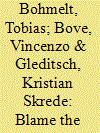

|
|
|
|
|
| Summary/Abstract |
Existing research argues that refugee inflows may increase the risk of domestic conflict, particularly civil war that, by definition, involves the state as an actor. However, many of the postulated mechanisms linking refugees to a higher risk of such conflict pertain to tensions with locals, which do not necessarily involve any grievances against government authorities. We contend that it is more likely to identify an association between refugees and non-state actor violence, that is, armed violence between organized non-state groups, neither of which pertains to the state. We also claim that the extent to which refugees are associated with a higher likelihood of non-state conflict depends on the capacity of governments to manage and mitigate risks. We report evidence that refugee populations can be linked to an increased risk of non-state conflict, as well as for a mitigating effect of state capacity on the risk of non-state conflicts in the presence of refugees. We do not find a clear effect of refugee populations on civil war, suggesting that the link depends on existing conflict cleavages relevant to mobilizing refugees or locals. Our research helps to shed light on the relevant security consequences of managing refugee populations. Despite the common arguments portraying refugees as security risks in developed countries, the risk of non-state conflict applies primarily to weak states that have been forced to shoulder a disproportionate burden in hosting refugees.
|
|
|
|
|
|
|
|
|
|
|
|
|
|
|
|
| 2 |
ID:
146502
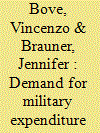

|
|
|
|
|
| Summary/Abstract |
This paper examines whether there are systematic differences in military spending between different types of autocratic regimes. We view military expenditure as an instrument a dictator can exploit in order to stay in power. How he utilises this instrument depends on the institutional set-up of his regime. We distinguish between military regimes, single party states and personalist regimes, and predict that military regimes should have the highest, whereas personalist dictatorships should have the lowest level of military spending. Using panel data on 64 dictatorships from 1960 to 2000, we find empirical evidence that our hypotheses are not rejected.
|
|
|
|
|
|
|
|
|
|
|
|
|
|
|
|
| 3 |
ID:
173886
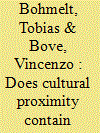

|
|
|
|
|
| Summary/Abstract |
What are the security consequences of population movements? This article seeks to provide a better understanding of when, how, and under what conditions terrorism diffuses across countries via migration flows as a vehicle. We contribute to this debate by studying the influence of migrants’ cultural proximity to the native population of their host country. It is argued that cultural closeness can contain such terrorism diffusion. Similarities in societal norms, customs, or beliefs seem likely to induce trust in the social interactions between migrants and locals. This, in turn, makes it more difficult for terrorist organizations to exploit transnational population movements for radicalization and as a recruitment pool – one of the core mechanisms linking population flows with terrorism. Conversely, migrants from culturally distant societies may find it more challenging to integrate into their new homes. A fertile ground for terrorist organizations for the recruitment of new followers is thereby more likely. Our analyses present consistent evidence that the effect of terrorism diffusing across countries weakens when accounting for cultural closeness between migrants and host societies. This key finding of our research has crucial implications for policy’s and scholars’ understanding of terrorism, the diffusion of terrorism across countries, and the security consequences of population movements.
|
|
|
|
|
|
|
|
|
|
|
|
|
|
|
|
| 4 |
ID:
112391
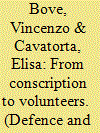

|
|
|
|
|
| Publication |
2012.
|
| Summary/Abstract |
A growing number of NATO countries suspended compulsory military service during the past decade or are now phasing it out, moving to an All Volunteer Force (AVF). An AVF can free resources available for investment in up-to-date equipments, thus improving operational capabilities. Our paper investigates shifts in NATO military expenditure shares on personnel, equipment, infrastructure and other costs over the period 1970-2008 and explores the impact of the transition to AVFs on these shares of the defence budget. Results suggest that while the end of conscription did not reduce the share of spending on personnel, NATO forces are increasingly less reliant on soldiers and more on capital.
|
|
|
|
|
|
|
|
|
|
|
|
|
|
|
|
| 5 |
ID:
188075
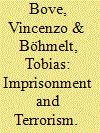

|
|
|
|
|
| Summary/Abstract |
While policymakers frequently praise the impact of law enforcement for addressing the threat of terrorism, several cases suggest that the imprisonment of terrorists and potential perpetrators may actually lead to (more) radicalization and, ultimately, a higher risk of terrorism. We take systematic stock of the arguments linking terrorism with incarceration and analyze newly collected data on worldwide prison populations. The results from quantitative analysis highlight that an increase in prison population is correlated with a decline in the number of terrorist attacks, in particular its domestic form. We conclude with a discussion of the implications of this finding for academic and policy circles.
|
|
|
|
|
|
|
|
|
|
|
|
|
|
|
|
| 6 |
ID:
148323
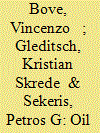

|
|
|
|
|
| Summary/Abstract |
We explore economic incentives for third parties to intervene in ongoing internal wars. We develop a three-party model of the decision to intervene in conflict that highlights the role of the economic benefits accruing from the intervention and the potential costs. We present novel empirical results on the role of oil in motivating third-party military intervention. We find that the likelihood of a third-party intervention increases when (a) the country at war has large reserves of oil, (b) the relative competition in the sector is limited, and (c) the potential intervener has a higher demand for oil.
|
|
|
|
|
|
|
|
|
|
|
|
|
|
|
|
| 7 |
ID:
167378
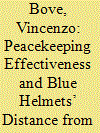

|
|
|
|
|
| Summary/Abstract |
United Nations (UN) peacekeeping missions are complex social organizations, with soldiers coming from several countries. In this environment, effective communication and interactions with local populations are often difficult, and establishing essential local support can be jeopardized when soldiers are culturally distant from local communities. At the same time, however, when local populations perceive peacekeepers as sufficiently distant or unbiased, the promotion of cooperation is enhanced. We explore whether cultural distance—in terms of geography, language, and religion—and social distance—in terms of economy and institutions—between the peacekeepers and the local population improve the operational capabilities of a mission. We use monthly information on UN peacekeeping missions’ composition from 1990 to 2015. We find that higher geographic and cultural distances correspond to higher levels of violence against civilians and higher battle deaths, whereas institutional and economic differences have the opposite effects, although these are less robust.
|
|
|
|
|
|
|
|
|
|
|
|
|
|
|
|
| 8 |
ID:
183146
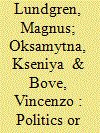

|
|
|
|
|
| Summary/Abstract |
International organizations face a trade-off between the need to replace poorly performing leaders and the imperative of preserving the loyalty of influential or pivotal member states. This performance-politics dilemma is particularly acute in UN peacekeeping. Leaders of peacekeeping operations are responsible for ensuring that peacekeepers implement mandates, maintain discipline, and stay safe. Yet, if leaders fail to do so, is the UN Secretariat able and willing to replace them? We investigate newly collected data on the tenure of 238 civilian and military leaders in thirty-eight peacekeeping operations, 1978 to 2017. We find that the tenures of civilian leaders are insensitive to performance, but that military leaders in poorly performing missions are more likely to be replaced. We also find evidence that political considerations complicate the UN’s efforts at accountability. Holding mission performance constant, military leaders from countries that are powerful or contribute large numbers of troops stay longer in post.
|
|
|
|
|
|
|
|
|
|
|
|
|
|
|
|
| 9 |
ID:
109191
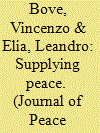

|
|
|
|
|
| Publication |
2011.
|
| Summary/Abstract |
We explore the supply side of peacekeeping - the determinants of a country's voluntary contributions to peacekeeping operations. We focus on troop contribution and examine a large set of operations, from UN-led missions to operations led by NATO, the African Union, the European Union, and ad hoc coalitions. We rely on a theoretical model of the private provision of public goods and a dataset on troop contribution across 102 states and 45 operations from 1999 to 2009 to explain both the conditions under which third-party actors are more or less likely to intervene in peacekeeping operations and the factors determining the size of their personnel contribution. We use the characteristics of the conflict to identify which types of conflicts attract outside intervention and the characteristics of the intervener to identify the countries more willing to provide troops. We show that at the domestic level, contributions are driven by the comparative advantage in manpower - or the relative value of labor - and constrained by the tolerance of casualties and the sustainability of multiple and concurrent missions. At the international level, the most robust explanations of when states choose to intervene are the level of threat to global and regional stability, the proximity to the conflict area, and the number of displaced people. In particular, security and humanitarian concerns trigger nation-specific responses. Our empirical findings provide further evidence of the centrality of country-specific gains in explaining the participation in peacekeeping. However, contributor-specific benefits play the same role in UN and non-UN peacekeeping missions, in contrast with previous empirical studies on the financial burden-sharing.
|
|
|
|
|
|
|
|
|
|
|
|
|
|
|
|
|
|
|
|
|